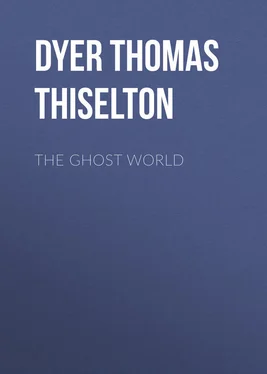Thomas Dyer - The Ghost World
Здесь есть возможность читать онлайн «Thomas Dyer - The Ghost World» — ознакомительный отрывок электронной книги совершенно бесплатно, а после прочтения отрывка купить полную версию. В некоторых случаях можно слушать аудио, скачать через торрент в формате fb2 и присутствует краткое содержание. Жанр: foreign_antique, foreign_prose, на английском языке. Описание произведения, (предисловие) а так же отзывы посетителей доступны на портале библиотеки ЛибКат.
- Название:The Ghost World
- Автор:
- Жанр:
- Год:неизвестен
- ISBN:нет данных
- Рейтинг книги:5 / 5. Голосов: 1
-
Избранное:Добавить в избранное
- Отзывы:
-
Ваша оценка:
- 100
- 1
- 2
- 3
- 4
- 5
The Ghost World: краткое содержание, описание и аннотация
Предлагаем к чтению аннотацию, описание, краткое содержание или предисловие (зависит от того, что написал сам автор книги «The Ghost World»). Если вы не нашли необходимую информацию о книге — напишите в комментариях, мы постараемся отыскать её.
The Ghost World — читать онлайн ознакомительный отрывок
Ниже представлен текст книги, разбитый по страницам. Система сохранения места последней прочитанной страницы, позволяет с удобством читать онлайн бесплатно книгу «The Ghost World», без необходимости каждый раз заново искать на чём Вы остановились. Поставьте закладку, и сможете в любой момент перейти на страницу, на которой закончили чтение.
Интервал:
Закладка:
Then there is the widespread Animistic belief, in accordance with which each man has several souls; – some lower races treating the breath, the dream ghost, and other appearances as being separate souls. This notion seems to have originated in the pulsation of the heart and arteries, which rude tribes regard as indications of independent life. Thus this fancy is met with in various parts of America and exists also in Madagascar. It prevails in Greenland, and the Fijians affirm that each man has two souls. This belief, too, is very old, evidences of its existence being clearly traceable among the ancient Greeks and Romans. 30 30 See Tylor’s Anthropology , p. 345; and Sir John Lubbock’s Origin of Civilisation and the Primitive Condition of Man , p. 141; and H. Spencer’s Principles of Sociology , 1885, i. p. 777.
Indeed, classic literature affords ample proof of how the beliefs of modern savages are in many cases survivals of similar notions held in olden times by nations that had made considerable progress in civilisation.
CHAPTER III
THE NATURE OF THE SOUL
It has from time immemorial been a widely recognised belief among mankind that the soul after death bears the likeness of its fleshly body, although opinions have differed largely as to its precise nature. But it would seem to be generally admitted that the soul set free from its earthly tenement is at once recognised by anyone to whom it may appear, reminding us of Lord Tennyson’s dictum in ‘In Memoriam’:
Eternal form shall still divide
The eternal soul from all beside;
And I shall know him when we meet.
Despite the fact that the disembodied spirit has been supposed to retain its familiar likeness, we find all kinds of strange ideas existing in most parts of the world as to what sort of a thing it really is when its condition of existence is so completely changed. Thus, according to a conception which has received in most ages very extensive credence, the soul has substantiality. This was the Greek idea of ghosts, and ‘it is only,’ writes Bishop Thirwall, ‘after their strength has been repaired by the blood of a slaughtered victim, that they recover reason and memory for a time, can recognise their living friends, and feel anxiety for those they have left on earth.’ A similar notion of substantiality prevailed among the Hebrews, and, as Herbert Spencer points out, ‘the stories about ghosts accepted among ourselves in past times involved the same thought. The ability to open doors, to clank chains, and make other noises implies considerable coherence of the ghost’s substance.’ 31 31 Principles of Sociology , 1885, i. p. 174.
That this conception of the soul was not only received but taught, may be gathered from Tertullian, who says: ‘The soul is material, composed of a substance different to the body, and particular. It has all the qualities of matter, but it is immortal. It has a figure like the body. It is born at the same time as the flesh, and receives an individuality of character which it never loses.’ He further describes 32 32 De Anima , p. 9; see Tylor’s Primitive Culture , i. p. 456.
a vision or revelation of a certain Montanist prophetess, of the soul seen by her corporeally, thin and lucid, aerial in colour, and human in form. It is recorded, too, as an opinion of Epicurus, that ‘they who say the soul is incorporeal talk folly, for it could neither do nor suffer anything were it such.’ It was the idea of materiality that caused the superstitious folk in years gone by to attribute to ghosts all kinds of weird and eccentric acts which could not otherwise be explained. And yet it has always been a puzzle in Animistic philosophy, how a ghost could be possessed at one moment of a corporeal body, and immediately afterwards vanish into immateriality, escaping sight and touch. But this strange ghost phenomenon is clearly depicted in sacred history, where we find substantiality, now insubstantiality, and now something between the two, described. Thus, as Herbert Spencer remarks, 33 33 Principles of Sociology , 1885, i. p. 174.
‘the resuscitated Christ was described as having wounds that admitted of tactual examination, and yet as passing unimpeded through a closed door or through walls.’ And, as he adds, the supernatural beings of the Hebrews generally, ‘whether revived dead or not, were similarly conceived: here, angels dining with Abraham, or pulling Lot into the house, apparently possess complete corporeity; there, both angels and demons are spoken of as swarming invisibly in the surrounding air, thus being incorporeal; while elsewhere they are said to have wings, implying motion by mechanical action, and are represented as rubbing against, and wearing out, the dresses of Rabbis in the Synagogue.’ All kinds of strange theories have been suggested by perplexed metaphysicians to account for this duplex nature of the disembodied soul; Calmet having maintained that ‘immaterial souls have their own vaporous bodies, or occasionally have such vaporous bodies provided for them by supernatural means to enable them to appear as spectres, or that they possess the power of condensing the circumambient air into phantom-like bodies to invest themselves in.’ 34 34 See Tylor’s Primitive Culture , i. p. 457.
In Fiji the soul is regarded quite as a material object, subject to the same laws as the living body, and having to struggle hard to gain the paradisaical Bolotu. Some idea, too, of the hardships it has to undergo in its material state may be gathered from the following passage in Dr. Letourneau’s ‘Sociology’ (p. 251): ‘After death the soul of the Fijian goes first of all to the eastern extremity of Vanna Levou , and during this voyage it is most important that it should hold in its hand the soul of the tooth of a spermaceti whale, for this tooth ought to grow into a tree, and the soul of the poor human creature climbs up to the top of this tree. When it is perched up there it is obliged to await the arrival of the souls of his wives, who have been religiously strangled to serve as escort to their master. Unless all these and many other precautions are taken, the soul of the deceased Fijian remains mournfully seated upon the fatal bough until the arrival of the good Ravuyalo, who kills him once and for all, and leaves him without means of escape.’
According to another popular and widely accepted doctrine, the soul was supposed to be composed of a peculiar subtle substance, a kind of vaporous materiality. The Choctaws have their ghosts or wandering spirits which can speak and are visible, but not tangible. 35 35 Dorman’s Primitive Superstitions , p. 20.
The Tongans conceived it as the aeriform part of the body, related to it as the perfume and essence of a flower; and the Greenlanders speak of it as pale and soft, without flesh and bone, so that he who tries to grasp it feels nothing he can take hold of. The Siamese describe the soul as consisting of some strange matter, invisible and untouchable. While Dr. Tylor quotes a curious passage from Hampole, 36 36 Tylor’s Primitive Culture , i. p. 456.
in which the soul, owing to the thinness of its substance, suffers all the more intense suffering in purgatory:
The soul is more tendre and nesche (soft)
Than the bodi that hath bones and fleysche;
Thanne the soul that is so tendere of kinde,
Mote nedis hure penaunce hardere y-finde,
Than eni bodi that evere on live was.
Then there is the idea of the soul as a shadow, a form of superstition which has given rise to many quaint beliefs among uncultured tribes. The Basutos, when walking by a river, take care not to let their shadow fall on the water, lest a crocodile seize it, and draw the owner in. The Zulu affirms that at death the shadow of a man in some mysterious way leaves the body, and hence, it is said, a corpse cannot cast a shadow. Certain African tribes consider that ‘as he dies, man leaves a shadow behind him, but only for a short time. The shade, or the mind, of the deceased remains, they think, close to the grave where the corpse has been buried. This shadow is generally evil-minded, and they often fly away from it in changing their place of abode.’ 37 37 Letourneau’s Sociology , p. 253.
The Ojibways tell how one of their chiefs died, 38 38 See Tylor’s Anthropology , 1881, p. 344.
but while they were watching the body on the third night, his shadow came back into it. He sat up, and told them how he had travelled to the River of Death, but was stopped there, and sent back to his people.
Интервал:
Закладка:
Похожие книги на «The Ghost World»
Представляем Вашему вниманию похожие книги на «The Ghost World» списком для выбора. Мы отобрали схожую по названию и смыслу литературу в надежде предоставить читателям больше вариантов отыскать новые, интересные, ещё непрочитанные произведения.
Обсуждение, отзывы о книге «The Ghost World» и просто собственные мнения читателей. Оставьте ваши комментарии, напишите, что Вы думаете о произведении, его смысле или главных героях. Укажите что конкретно понравилось, а что нет, и почему Вы так считаете.












